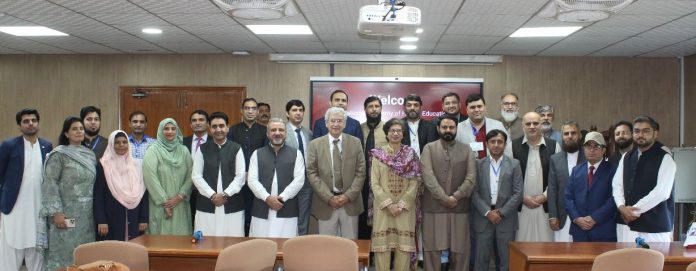ISLAMABAD, OCT 7 /DNA/ – The National Academy of Higher Education (NAHE), Higher Education Commission (HEC) of Pakistan, successfully concluded its two-week Faculty Development Program for Associate Professors from public sector higher education institutions of Pakistan at NAHE, HEC Islamabad.
In his welcome address, Mr. Sulaiman Ahmad, Director of the National Academy of Higher Education (NAHE), provided an insightful overview of the training and shared his perspective on the evolving landscape of employment in the age of artificial intelligence. He remarked that the future of jobs is being reshaped by artificial intelligence, automation, and global connectivity. Traditional roles are rapidly evolving, and new ones are emerging that demand not just technical expertise, but also adaptability, creativity, and emotional intelligence. Our education system must rise to this challenge—preparing students not merely for employment, but for lifelong learning, ethical leadership, and global citizenship. In this context, life skills are no longer optional; they are essential.
The Chief Guest, Dr. Noor Amna Malik, Managing Director of NAHE at HEC, outlined the wide scope of the training modules. These modules aim to strengthen academic, research, and administrative areas. They cover excellence in higher education teaching, research innovation, and effective academic planning. Other topics include psychological and educational strategies for faculty and students, organizational communication, and technology integration in higher education. The modules also address assessment and evaluation, institutional administration and management, audit and financial oversight, project lifecycle management, and procurement processes.
Dr. Noor Malik underscored the importance of the cascading model, emphasizing that participants are expected to transfer the knowledge and skills gained during the program to their respective institutions. She reaffirmed HEC’s unwavering commitment to advancing academic excellence across Pakistan and commended the NAHE team for successfully delivering impactful training initiatives.
The Faculty Development Program not only underscores NAHE’s unwavering commitment to academic advancement and innovation but also directly supports and contributes to several United Nations Sustainable Development Goals (SDGs), including SDG 4: Quality Education – Ensure inclusive and equitable quality education and promote lifelong learning opportunities for all, SDG 5: Gender Equality – Achieve gender equality and empower all women and girls, SDG 8: Decent Work and Economic Growth – Promote sustained, inclusive and sustainable economic growth, full and productive employment and decent work for all, SDG 10: Reduced Inequalities – Reduce inequality within and among countries, SDG 13: Climate Action – Take urgent action to combat climate change and its impacts, and SDG 16: Peace, Justice, and Strong Institutions – Promote peaceful and inclusive societies for sustainable development, provide access to justice for all and build effective, accountable and inclusive institutions at all levels.
Certificates of participation were distributed, and attendees expressed appreciation for the program’s relevance and practical approach. The training reflects a growing commitment to equipping educators with tools to prepare students for a rapidly changing world.

















